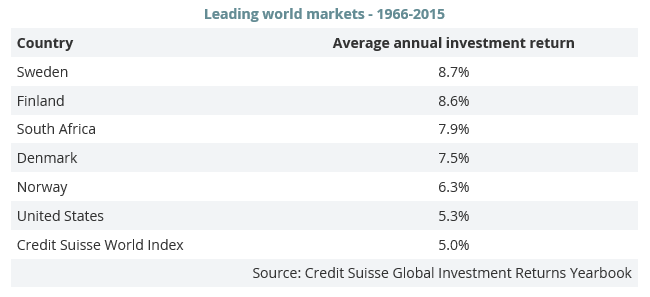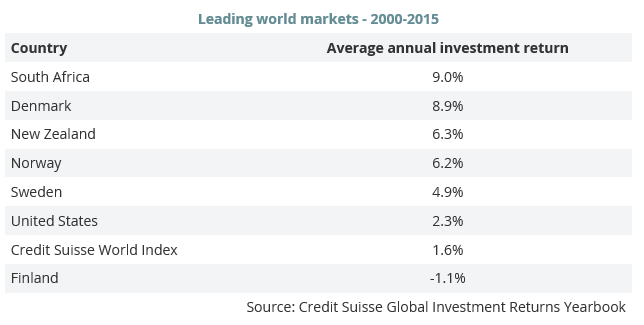Nordic countries often have beaten global benchmarks and U.S. markets for more than a century
Sen. Bernie Sanders is unlikely to be elected president, but his campaign has put “democratic socialism” on the political agenda — or at least that of the Democratic Party.
And when you say “democratic socialism,” Scandinavia or the Nordic countries — Norway, Sweden, Denmark and Finland — immediately come to mind.
No matter what you think of those countries’ political systems — and I don’t believe their approach would work in the U.S. — their accomplishments have been impressive.
Despite government-provided health care and higher education, extended parental leave and substantial unemployment benefits paid for by tax rates that can easily top 50% of income, Nordic countries are among the world’s most prosperous.
The four major Nordics rank among the top dozen countries on the World Economic Forum’s Global Competitiveness Index. Norway, Sweden and Denmark still have AAA credit ratings.
They are leaders in other measures of well-being, too. Finland’s education system is one of the world’s best, and the latest World Happiness Report says the Danes are the happiest people on Earth. A 2015 GoEuro report said Sweden had the world’s most powerful passport.
And one more thing: Over more than a century, as well as in the recent past, their stock markets have been top performers.
Elroy Dimson, Paul Marsh and Mike Staunton of the London Business School have assembled the definitive database of 21 established stock markets, going back to 1900. The 2016 Credit Suisse Global Investment Returns Yearbook, in which the three researchers updated that database, shows the Nordic countries often have beaten global benchmarks and U.S. markets over the past 116, 50 and 15 years.
These tables tell the story. From 1900 to 2015, Sweden, Denmark and Finland were in the top eight global markets, outperforming the Credit Suisse Global index.
From 1966 to 2015, those three countries were among the world’s top four, and Norway wasn’t far behind, beating the Credit Suisse index and the U.S.
And from 2000 to 2015, Norway, Sweden and Denmark were in the top five global markets, again topping the U.S. and the index, although Finland lagged, probably because of the decline of phone maker Nokia, its dominant stock.
What explains those markets’ success?
Natural resources, for one. “The 20th century was a time when to be resource-rich was worthwhile,” Dimson told me in a telephone interview. (South Africa and Australia top long-term global market performance, the researchers found.)
Norway is the world’s 14th-largest oil producer, pumping 1.9 million barrels a day.
Sweden and Finland historically have been big producers of natural resources, including timber and iron ore.
But those countries have been particularly effective users of human capital. Despite sky-high taxes — which supply-side economists argue should kill entrepreneurship, as it has in California (just kidding) — these countries are founts of innovation.
According to Inc. Magazine, Norway has more entrepreneurs and more start-up activitiesper capita than the U.S.
Sweden has been at the digital economy’s cutting edge, spawning Skype, Spotify and Minecraft creator Mojang.
Denmark’s Novo Nordisk is one of the world’s leading pharmaceutical companies.
Swedish-launched IKEA and Denmark’s Lego are among the most successful private companies.
So, clearly, high taxes and a big welfare state have been no impediment to capitalist success, at least as measured by stock market performance.
In fact, six Scandinavian researchers published a report called “The Nordic Model” in 2007 in which they argued that the welfare state and high taxes actually helped those countries succeed.
“The Nordics have been embracing both globalization and the welfare state, and … the security offered by collective mechanisms for sharing risks has been instrumental in enhancing a favorable attitude,” the study said.
“Collective risk sharing helps make globalization acceptable to citizens … by facilitating adjustments that allow the economy to benefit from changing markets,” the report continued. “While having large public sectors, the Nordics are also embracing the market economy and actions to foster competition.”
In other words, those countries aren’t really “socialist,” but vibrant capitalist economies with high taxes and big safety nets, and they’ve instituted free-market reforms in recent years.
Could that work here? I doubt it. The U.S. has 12 times the population of all those countries combined, and we are one of the most diverse countries on Earth, while the Nordics are among the most homogeneous, with a strong work ethic and a belief in personal responsibility.
In Scandinavia, there is solid popular support for the system, while we are bitterly divided over these issues.
Also, the Nordic countries are facing aging populations, which will strain the welfare state’s resources, and social cohesion has frayed as anti-immigrant parties have made strong gains, a trend likely to continue after terrorist attacks like the one in Brussels on Tuesday.
Paradise they’re not, and their system isn’t for everyone. But numbers are numbers and facts are facts: Nordic “socialism” works well for those countries and has paid off for investors, too.
Howard R. Gold is a MarketWatch columnist and founder and editor of GoldenEgg Investing, which offers exclusive market commentary and simple, low-cost, low-risk retirement investing plans. Follow him on Twitter @howardrgold.
http://www.msn.com/en-us/money/markets/socialism-is-bad-nordic-stock-markets-are-among-the-best/ar-BBqRAcg?li=BBnbfcN
Tags: 2016 Credit Suisse Global Investment Returns Yearbook, Alpha Natural Resources Inc., Australia, democratic socialism, Denmark, Finland, health care, higher education, natural resources, new zealand, Nordic countries, Norway, south africa, Sweden, U.S., U.S. markets, unemployment benefits, welfare state, World Economic Forum’s Global Competitiveness Index, world happiness report
 Oxstones Investment Club™
Oxstones Investment Club™

